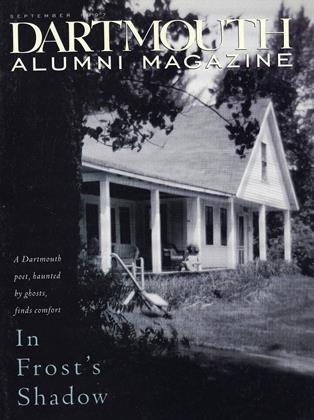A Family Affair
Over Memorial Day weekend, the Black Alumni of Dartmouth Association W(BADA) celebrated its 25th Anniversary. Two hundred alumni, spouses, and children, representing classes from 1949 through currentundergraduates, came to Hanover for the three-day. event.
The weekend's official theme was social, economic, and political empowerment, but the gathering was also a rime to re-energize the commitment we as black alumni have to our Dartmouth legacy. Over arid over in workshop discussioris, and group conversations I heard people saying how great it was to come together to ac- knowledge the contribution made by those who founded BADA and to provide mentoring to younger alumni and students.
"My sense of history and destiny stems way lack from my great-grandmother, who used to tell me stories about where my family came from," BADA president Morris "Rocky" Whitaker '74 told me, "Al African Americans at Dartmouth, we know where we have come from. We can'seeour tree.'' He reminded us that die tree did not first take root during the civil rights era of the 19605, but rather 169 years ago with Ed- ward Mitchell, class of 1828. Denied admission when he applied in 1824, Mitchell was admitted only after students petitioned die Trustees. Mitchell, who later became a minister, was the fourth black to graduate from an American college.
Another member of the family tree, Bernie Fulton '55, wrapped up a session on economic prosperity by saying," Don't let anybody make you think you have no self worth; that you can't compete, that you aren't the best and the brightest. Because you are." It was uplifting to hear words of confirmation from somebody with years of experience and perspective.
I couldn't help thinking about a question posed to me at a recent Dartmouth Club of Philadelphia dinner: Why was there a need for a group such as BADA? I responded that for some black alumni, BADA was their only tie to the College. Over die reunion weekend, many other alumni echoed this sentiment. "If there was not a BADA, I never would have reconnected with the college," Donna Humphrey '76 remarked. "I still haven't forgiven the racism. I don't really go to Dartmouth Club of New York functions unless they are connected with BADA, because I don't feel comfortable, even now."
That is why BAD A came into being, says founding member, R. Harcourt Dodds '5B. "BADA represented an important avenue for people to participate who might have otherwise felt a continuing alienation from the College. But we always regarded it as an important adjunct to the activities of the organized alumni, not as a substitute."
For those of us celebrating BADA's 25th year, the shared spirit of renewaland rejuvenation is what mattered most. As Victor L. Hoskins '79. who had not been on campus for 1-years, observed. "At the first reception, the organizers tried to get evetyqne to stop talking, to do something that was on the agenda. They didn't realize what we were doing was reconnecting. What we were doing was the agenda."
Deirdre Harris '92 and Gwen Pointer '90 (right); organizer Kenny Mitchell '97 looks on.
 View Full Issue
View Full Issue
More From This Issue
-
 Cover Story
Cover StoryIn Frost's Shadow
September 1997 By CLEOPATRA MATHIS -
 Feature
FeatureThe Tightrope
September 1997 By Dan Fagin '85 -
 Feature
FeatureUninight
September 1997 By DOUGALD MACDONALD '82 -
 Feature
FeatureThe Cult of Domesticity
September 1997 By Christine Altieri -
 Article
ArticleRoad Trip
September 1997 By Sarah Moore -
 Article
ArticleElevator Going Up, AstroTurf Going Down
September 1997 By "E. Wheelock."
Article
-
 Article
ArticleProfessor Emeritus
August 1944 -
 Article
ArticleFrom the Man Who Ought to Know
December 1992 -
 Article
ArticleWinter Sports
March 1961 By CLIFF JORDAN '45 -
 Article
ArticleALUMNI OPINION
May, 1911 By DAVID J. MAIN -
 Article
ArticleMedical School
FEBRUARY 1964 By HARRY W. SAVAGE M '27 -
 Article
ArticleValedictory to 1955
July 1955 By PRESIDENT JOHN SLOAN DICKEY

